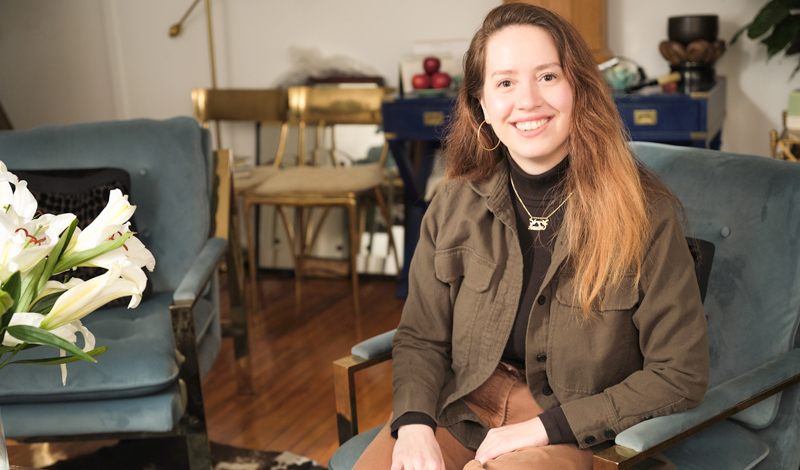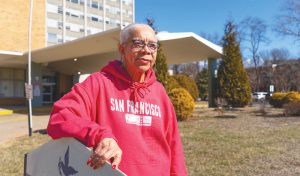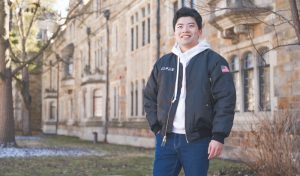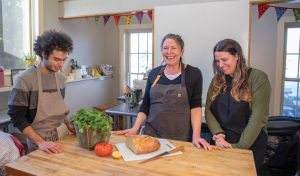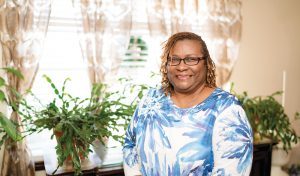by Amelia Gonzalez
New York
Since my early teens, I’d known my father belonged to a notorious motorcycle “club,” and I wasn’t shocked when my mother told me in 2011, my junior year of high school, that he’d been involved in a brawl with a rival gang and stood accused of killing their president. I knew it would be national news—that tomorrow I’d wake in a world that knew me first and foremost as the daughter of a man accused of murder.
“Hard work brings success!” was the lesson he’d imparted most often, but that night, from behind bars, he gave a very different kind. Something like: Forget about hard work, Amelia. No matter how hard you try, your future is decided by things beyond your control. I started skipping classes, partying and doing drugs.
I was raised by my mother in the “Garden of Soka,” but I’d never done more than allow myself to be carted along to meetings. It wasn’t until I got an ultimatum from my principal and encouragement from my young women’s leader that I realized it was time to take a stand in faith and in life. I began to participate regularly and seriously, studying The New Human Revolution and attending all my classes. What’s more, my seniors in faith taught me that sharing Buddhism with others, or shakubuku, was the essence of faith.
My friends, seeing me change, wanted to give Buddhism a try, too. In March 2013, I was accepted to Antioch College on a full scholarship. In my last years of high school, several of my friends joined the SGI and together we dramatically transformed our lives.
There remained one person, though, who I felt certain was incapable of change: my father. When my young women’s leader suggested that I chant for his happiness, I shot back: “No way. You don’t know him.”
In April, I was invited, along with other incoming freshman, to tour the Antioch campus. While there, some students invited me to smoke a little marijuana, and we did. Upon returning home, I received a letter from Antioch. They were suspending my scholarship—news of the marijuana had reached administration; I had 48 hours to respond. I chanted abundant daimoku about my response and, in the weeks after sending it, quit drugs and parties completely. Reflecting deeply, I realized I had a lot of inner work to do and also that by not sharing Buddhism with my father, I was withholding an opportunity for him to do his.
That spring, I called him. “Please try chanting,” I said. “And let’s get you subscribed to the World Tribune.”
My father’s trial was slated for August, one month out from the start of my freshman year at Antioch (that is, if they’d still have me). I chanted abundant daimoku, making every possible cause I could think of for the sake of kosen-rufu. Actually, I was making so many causes that I felt victory ought to be assured. “If my father isn’t acquitted, I’m gonna stop practicing,” I told my young women’s leader. That month, I received a letter back from Antioch, reinstating my scholarship—a major breakthrough but only part of the one I felt I deserved. My father’s trial date came and went. He was given a life sentence and taken to a prison in the heart of a Nevada desert. I moved to Ohio for my first year of college.
By this time, it was clear to me, if not yet to the country, that my father was innocent, that he’d done what he had in self-defense. Sure, it might take a few months, but surely the court would correct its mistake. But I was wrong, they didn’t. Years passed by—freshman, sophomore and junior years of college, with my father still in a prison. A prison, mind you, that didn’t take phone calls. Mostly, we wrote.
“Though in prison, I feel happy,” one letter read. And another: “Amelia, please accept the reality. I may be in here for life.” He was chanting and reading the SGI-USA publications and wasn’t bemoaning his fate, but he could see where his cards were falling. But I wasn’t interested in “accepting the reality.” I was bent on changing it.
“No way,” I wrote back. “You’re gonna be at my graduation.”
In April 2017, the case against my father collapsed; the star witness signed an affidavit admitting his testimony had been a lie. For a moment it seemed my father would be freed in time to see me graduate in May, but bad news followed quickly: the federal government was leveling a new charge, this time against his motorcycle club as a whole, and this time my father faced the death penalty. Seeking more deeply for the confidence that Nichiren Daishonin’s teachings and Ikeda Sensei’s guidance are absolute, I flew to Nevada to testify in the winter of 2019 convinced that my prayer and my actions for the sake of Buddhism were at the heart of everything.
On Feb. 24, 2020, after nine years of imprisonment, my father was acquitted of all charges and released the same day. And in June of last year, he received the Gohonzon, something that had once seemed a pipe dream.
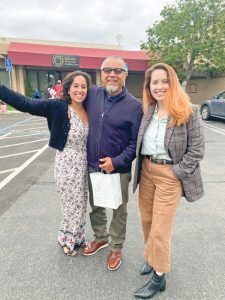
Sometimes I wonder what would have happened had my father been acquitted in 2013. Would I have continued to strive in faith, or would I have felt satisfied with my “bargain with Buddhism” and left it at that? What I know is that over nine years, there were countless times I wanted to give up, countless times I thought that my happiness was impossible, that I was not in control of my destiny. Because of this ordeal, I had to dig deep and then deeper, had to seek out guidance and work hard to apply it to my life. What I know is that this experience has made me a stronger person, a person who lives with the conviction that Nam-myoho-renge-kyo can move the universe.
“Viewed from the profound perspective of Buddhism, your suffering is like that portrayed by a brilliant, highly paid stage actress cast in the role of a tragic heroine. … Just as a great actress relishes performing her tragic role, please rise from the depths of your sorrow to boldly act out a magnificent drama of human revolution.”
from Ikeda Sensei (The New Human Revolution, vol. 1, revised edition, p. 274)
You are reading {{ meterCount }} of {{ meterMax }} free premium articles

